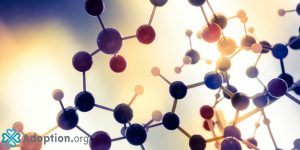When using DNA to find your birth family, you need to contact your state’s adoption registry to request your non-identifying information. The info included may vary, but usually includes at least a basic physical description and age for your biological parents at the time of your birth. It will sometimes have information about your grandparents as well. The information will be valuable to help identify your parent from the family of a DNA match. It ensures that all of the pieces of the puzzle fit together if you don’t have a direct match. It’s also useful to have when making initial contact. It tends to put to rest any doubts that you are who you say you are.
There is a common misconception that in order to find a family member by using DNA, that specific person has to have tested. That is thankfully not the case. Your parent does not have to have taken a test for DNA to be successful. For example, Ancestry results show matches based on you sharing a certain number of centimorgans per an amount of DNA segments with a person. Based on that info, it will show a match as Aunt/Uncle/Niece/Nephew/Half-Sibling/Grandparent or a further relative. You use the public family trees from your matches in conjunction with public records and your non-id info to find your birth family.
If you don’t have any close matches, don’t get discouraged. New people are submitting DNA tests every day. Make sure you keep checking back for closer matches. If you have questions, the Facebook pages DNA Newbie and DNA Detectives can be helpful. If you feel like the answers are right in front of you, but you just aren’t getting them, you might consider using a search angel. Search angels can be found on adoption registry sites, as well as on Facebook pages for adoptees.
For a comprehensive adoption training guide, visit the new search and reunion website AdoptionInformation.com.
Ashley Foster is a freelance writer. She is a wife and a mother of two, currently residing in Florida. She loves taking trips to the beach with her husband and sons. As an infant, she was placed with a couple in a closed adoption. Ashley was raised with two sisters who were also adopted. In 2016, she was reunited with her biological family. She advocates for adoptees’ rights and DNA testing for those who are searching for family. Above all, she is thankful that she was given life.
